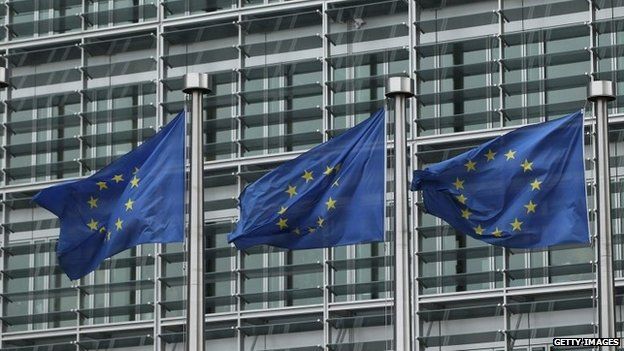No UK trade benefit from EU membership - Civitas report
- Published

The report questioned the quality of the EU's collective trade agreements
EU membership has not given the UK any "insider advantages" in trade with other European countries, a report by social policy think tank Civitas says.
It says trade with fellow EU nations makes up no more of the UK's trade with all top economies now than it did when it first joined the EEC in 1973.
The benefit of collectively negotiated EU free trade deals is also questioned.
The government says the EU share of UK trade has remained consistent because of a huge growth in other markets.
It seems to contradict analysis by the Confederation of British Industry.
The Civitas report - called Where's the Insider Advantage? - adds that EU membership does not appear to have benefitted UK service industries either, although it admits the data available on this is not so detailed.
The report, by corporate market researcher Michael Burrage, says, external: "There is no evidence to suggest that the 'heft' or 'clout' of the EU has helped secure more FTAs than those that might have been secured by independent negotiations.
"There were 25 EU FTAs in force in 2012 while the Swiss had independently negotiated 26, 13 of which came into force before those of the EU and three in the same year." It adds that there is no evidence that the quality of the EU's trade agreements is any higher.
The report concludes: "The evidence presented contradicts again and again those who wish to claim that the UK has enjoyed insider advantages in the single market."
Civitas says the UK's trade with other EU nations accounts for no more of its trade with all leading economies than it did on joining the European Economic Community in 1973.
Raging argument
The CBI's recent Our Global Future report said full membership of the EU was "a better vehicle for harnessing the global trends reshaping the world economy than all the alternative options put forward".
"The European Union also supports UK business in realising its global ambitions by providing significant influence over the rules, policies and priorities that allow British-based firms to seize opportunities across the globe," it stated.
"It anchors UK trade around the world through the signing of high-quality, ambitious Free Trade Agreements and the creation of globally recognised standards that open markets.
"And in a world of competing ideas and ideals - where international action is increasingly the avenue for addressing problems across the globe - UK membership of the EU amplifies Britain's voice internationally."
BBC political correspondent Chris Mason says the contrasting views illustrate the growing intensity of an argument now raging at the heart of British politics - should the UK's future be inside or outside the EU?
The rise of the UK Independence Party has made this a mainstream political talking point in the run up to the European Parliament elections later this month, the general election in a year's time and the in-out referendum on EU membership in 2017 promised by the Conservatives if they win the next election, he adds.
A spokesman for the Department for Business, Innovation and Skills said: "The European Union remains the UK's most important export market - half of our trade goes to the single market and around 3.5 million UK jobs are linked to UK exports to EU member states.
"Through the trade agreements that we negotiate as part of the world's largest economic area, we are able to gain access to important and rapidly growing global markets.
"The EU's share of UK trade has remained consistent because of the huge growth in other markets in the same period."
- Published28 April 2014
- Published24 April 2014
- Published4 April 2014
- Published1 April 2014